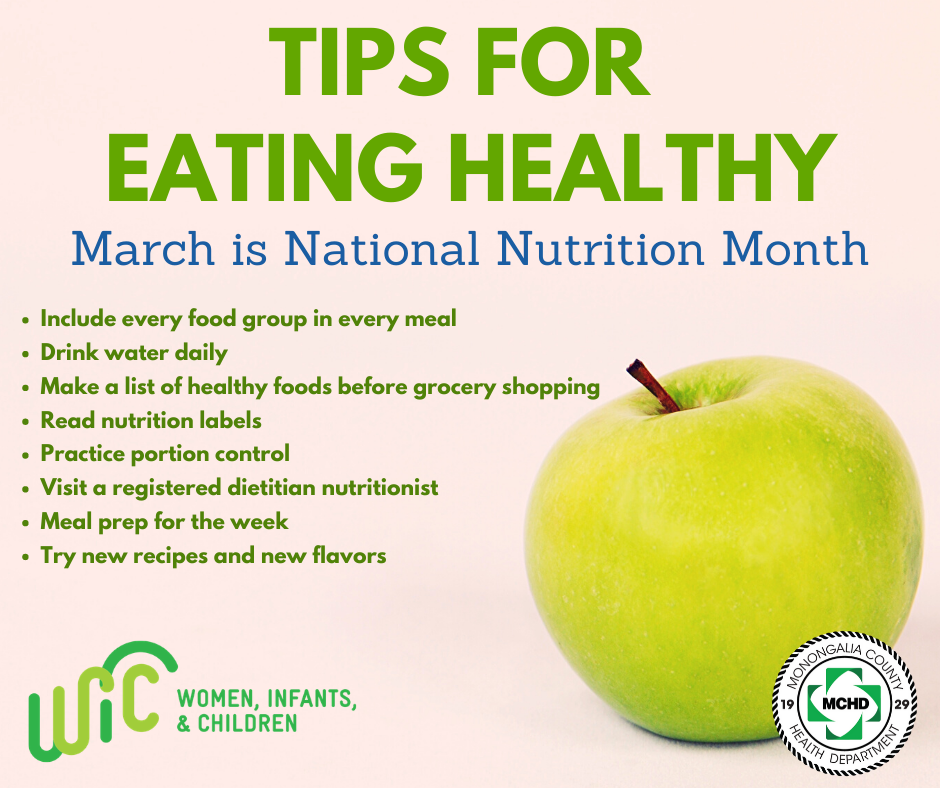Eating healthy can be challenging even in easier times

Mar. 31, 2020
By Kenzie Bostick
Everyone is always told they should eat healthy, but how many people actually do it? National Nutrition Month ends today, but eating right is something we should always try to be more aware of what we eat and how it can impact our health. This can be harder when COVID-19 has forced us to stay in our homes for the foreseeable future, and yet, it’s more important than ever.
According to the Centers for Disease Control and Prevention, just one in 10 children and adults eats the recommended daily amount of vegetables. The number of people not getting enough fruit in their diet isn’t much better, with only one in seven adults and four in ten children eating enough.
Each meal should include a grain, protein, fruit, dairy, vegetables and oil. This can be more difficult to achieve currently, perhaps because of concerns about who has touched produce or being unable to go to the grocery store as often as before the pandemic. For now, you can buy frozen or canned produce. It lasts longer than fresh produce.
Eating healthy will not be as beneficial if you eat too much, though. Practicing portion control is a key step in ensuring that you are getting the amount of each nutrient that you need. Being stuck in the house can lead to eating because you’re bored, but be mindful of how much you’re snacking and eating when you’re not actually hungry.
Eating healthy can take some planning ahead. It all starts at the grocery store. Make a list of healthy foods before you go shopping, so you’re less likely to impulsively throw those cookies or ice cream in the shopping cart. Try planning your meals for the week in advance, so you are less likely to eat unhealthy snacks and meals because you’re hungry. Planning ahead can ensure that you buy enough food to last for a week or more, helping you avoid unnecessary trips to the store and risking illness. Having a planned menu could also help create a sense of stability and routine in a time when everyone’s daily routines have been disrupted.
With restaurants only offering takeout or delivery, it is easier than ever to be mindful of what you’re ordering, because you have to order ahead of time and cannot impulsively add food you don’t really want. Many restaurant meals can be made yourself at home, with a healthier recipe and smaller portions. It’s hard to make eating healthy a habit if you dread eating the dishes you are creating. Learning how to cook new meals and experimenting with new flavors can make eating healthy seem more fun.
In order to know if you are eating healthy or not, you must learn how to correctly read nutrition labels. You should begin by reading the serving size and total calories per serving. Next, you should read the percent daily values. These are normally based on a 2,000-calorie-a-day diet. You should eat foods low in added sugar, sodium and saturated fat. Aim for a high percentage of vitamins, minerals and fiber.
An often-overlooked part of nutrition is staying hydrated. While drinking a lot of water is always important, it’s also a way to reduce your COVID-19 risk and also something you should do if you get sick.
The daily recommended amount to drink varies by age, gender and whether or not you are pregnant or breastfeeding. While drinking water by itself is a great way to stay hydrated, there is also water from foods and drinks that counts towards your daily recommended amount.
We should be eating healthy every month, not just during National Nutrition Month, but it is a great reminder of the importance of making good choices about what goes in our bodies. If you need more help figuring out how to get the right amount of nutrients, try seeing a registered dietitian nutritionist. Taking care of yourself can make social distancing a little more bearable. It is important to take care of yourself both physically and mentally during these times.
Kenzie Bostick is a public information office intern at Monongalia County Health Dept.